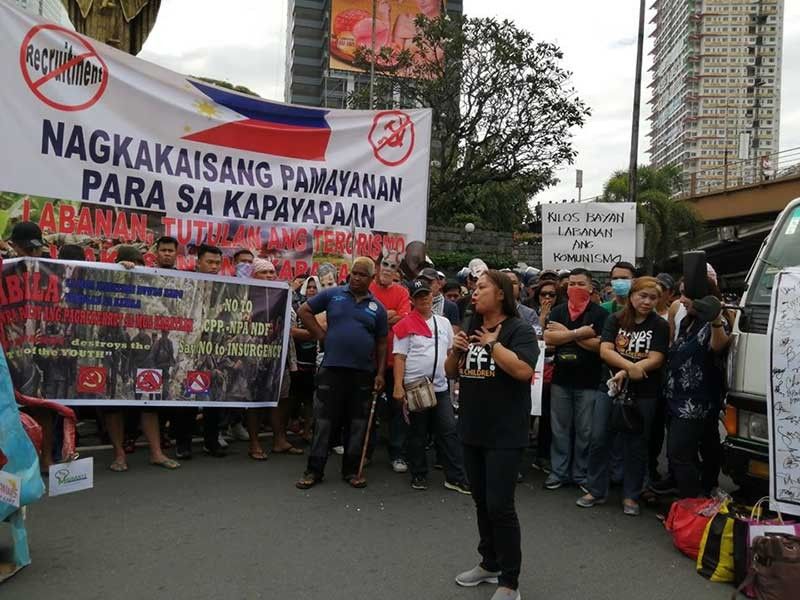
MANILA, Philippines — Although the Christmas ceasefire is a welcome development, "localized" peace talks with communist rebels are the best way to end the 51-year-old insurgency, presidential peace adviser Carlito Galvez Jr. said in a statement.
The government has opted for the localized talks, which it calls Local Peace Engagements, to negotiate the surrender of members of the New People's Army and of local communist militias.
READ: OPAPP: New panel to oversee localized 'peace engagements' with Reds
"The LPE approach directly addresses the needs of people and communities and prevents them from being exploited by the insurgents. The government provides basic services, livelihood, and security, among others, as a means of capacitating them," Galvez said.
The Communist Party of the Philippines has rejected the "localized" peace talks, saying the reforms needed to end the insurgency must be on a national level.
"Localized talks are a classic divide and rule tactic. The idea is to hoodwink local CPP leaders and NPA commanders into agreeing to local ceasefire arrangements and later on induce them to surrender," the National Democratic Front of the Philippines, which represents the communist rebels at peace talks, also said in July 2018.
But Galvez said the LPEs have led to mass surrenders "of members of the CPP-NPA Southern, Northeastern, and Western Mindanao Regional Party Committees operating in Regions [Zamboanga Peninsula], [Northern Mindanao], [Davao] and CARAGA."
RELATED: 'Honest mistake': Army apologizes for manipulated photo of alleged rebels
"Through the efforts of local chief executives, the Regional Task Force – Ending Local Communist Armed Conflict (RTF-ELCAC) IX, and the CPP-NPA’s Western Committee, the parties forged an agreement in which they committed to jointly carry out socio-economic programs and projects in their communities," he said.
Galvez said that he is hopeful that unilateral but reciprocal ceasefires declared by the government and by the Communist Party of the Philippines would be "a step towards finally putting an end to the armed violence" but also warned that peace talks have not prevented rebel attacks.
"As peace talks were being held at the national level, attacks were being carried out by the rebels. In short, there have already been precedents. We have to be prepared and make sure that such incidents are prevented at all costs," Galvez said.
READ: Palace: Reds must explain attacks during ceasefire
The government has opted for the localized talks, which it calls Local Peace Engagements, to negotiate the surrender of members of the New People's Army and of local communist militias.
READ: OPAPP: New panel to oversee localized 'peace engagements' with Reds
"The LPE approach directly addresses the needs of people and communities and prevents them from being exploited by the insurgents. The government provides basic services, livelihood, and security, among others, as a means of capacitating them," Galvez said.
The Communist Party of the Philippines has rejected the "localized" peace talks, saying the reforms needed to end the insurgency must be on a national level.
"Localized talks are a classic divide and rule tactic. The idea is to hoodwink local CPP leaders and NPA commanders into agreeing to local ceasefire arrangements and later on induce them to surrender," the National Democratic Front of the Philippines, which represents the communist rebels at peace talks, also said in July 2018.
But Galvez said the LPEs have led to mass surrenders "of members of the CPP-NPA Southern, Northeastern, and Western Mindanao Regional Party Committees operating in Regions [Zamboanga Peninsula], [Northern Mindanao], [Davao] and CARAGA."
RELATED: 'Honest mistake': Army apologizes for manipulated photo of alleged rebels
"Through the efforts of local chief executives, the Regional Task Force – Ending Local Communist Armed Conflict (RTF-ELCAC) IX, and the CPP-NPA’s Western Committee, the parties forged an agreement in which they committed to jointly carry out socio-economic programs and projects in their communities," he said.
Galvez said that he is hopeful that unilateral but reciprocal ceasefires declared by the government and by the Communist Party of the Philippines would be "a step towards finally putting an end to the armed violence" but also warned that peace talks have not prevented rebel attacks.
"As peace talks were being held at the national level, attacks were being carried out by the rebels. In short, there have already been precedents. We have to be prepared and make sure that such incidents are prevented at all costs," Galvez said.
READ: Palace: Reds must explain attacks during ceasefire

No comments:
Post a Comment
Note: Only a member of this blog may post a comment.